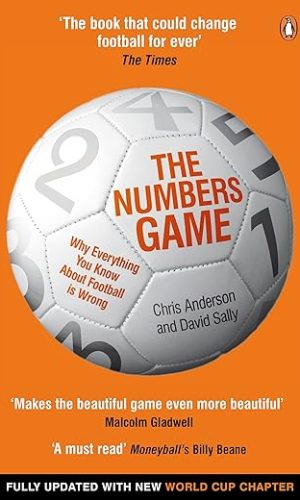Expected Goals: The story of how data conquered football and changed the game forever
£7.30£9.50 (-23%)
Shortlisted for the William Hill Sports Book of the Year Award 2022
Football has always measured success by what you win, but only in the last twenty years have clubs started to think about how you win. Data has now suffused almost every aspect of how football is played, coached, scouted and consumed. But it’s not the algorithms or new metrics that have made this change, it’s the people behind them.
This is the story of modern football’s great data revolution and the group of curious, entrepreneurial personalities who zealously believed in its potential to transform the game. Central to this cast is Chris Anderson, an academic with no experience in football, who saw data as an opportunity to fundamentally change a sport that did not think it could be changed. His aim: to infiltrate the strange, insular world of professional football by establishing a club whose entire DNA could be built around data.
Expected Goals charts his remarkable journey into the heart of the modern game and reveals how clubs across the world, from Liverpool to Leipzig and Brentford to Bayern Munich, began to see how data could help them unearth new players, define radical tactics and plot their path to glory.
Read more
Additional information
| Publisher | Mudlark (30 Mar. 2023) |
|---|---|
| Language | English |
| Paperback | 304 pages |
| ISBN-10 | 0008484074 |
| ISBN-13 | 978-0008484071 |
| Dimensions | 12.9 x 1.9 x 19.8 cm |











by Ed
To the author’s credit, he made it clear from the outset that this is a story of the people behind the ever evolving use of data analytics in football. With respect to those people, their personal stories don’t interest me and accordingly i found the book trying. The author does tell their stories well and it is engaging enough but upon ordering i had expected a more data driven book and accompaniment to watching football, which this is not.
by R. O’neill
Full disclosure I work in a numerical modelling based role so this might have influenced some of my conclusions about this book.
Overall: An interesting book, which could have been much shorter to cover the material included or could have been more in depth. At times it felt like there was a lot of padding in the prose to get to some sort of pre-ordained word limit. The subject material is interesting, however I was left wanting more detail. So a good first effort in an interesting subject with room for the author to grow in future. Worth a read.
Pros:
– Clearly the author is deeply knowledgeable about this period of football development and has studied a few key examples closely. The author is also well read on the subject and does not presuppose he is the first to cover such ground.
– It is insanely easy with such technical material at its root to slip into complex technical speak. The author avoids this and I think most football fans would have no problems with the material covered here. This is a major strength, the book does not talk down to those who don’t care about the intricacies of statistical modelling, nor does it assume one must be a genius to understand such things. It is clear the author would rather have a genuine discussion of the use of data which all fans can access.
Cons
– The descriptions of certain elements gets a bit repetitive (the smart well intentioned outsider, the entrenched former pro) and these do over labour the points a bit.
– Any book of this nature is cursed to be out of date as soon as it is released, case in point Liverpool’s performance has not been as stellar this season as the period the book ends with, nor is there little opportunity to discuss how a new strategy to things, like Chelsea’s might disrupt the staus quo.
– There is little attempt to put forward counter arguments, such as a traditionalist’s view that not all forward passes etc. are created the same or that there are things data can not show you. These are noted as other elements in the process but the tone is overly evangelical on behalf of the advocates of data science.
– The author has made the move into long form work here. I think in 10 years they will have developed their own style (this seems to become more so in the last third of the book) but for now there is some element of aping the style of Michael Lewis. This is not necessarily a big issue, as Lewis is a fantastic writer, but I’d like to see more of the Rory Smith we get on the Monday Night Club etc.
by Chris Heathman
If you haven’t read anything on the rise of football analytics then this is a decent book. However, if you’ve already read books such as ‘Football Hackers’ by Christoph Biermann then it’s a waste of money. This book doesn’t tell a story which hasn’t already been told or break new ground, and for me ‘Football Hackers’ does a better job. Given the year it was published it would have been better to be a book about the development in analytics and the future. What’s being worked on in the industry now?
by Rio De Janeiro
Rory’s written an excellent account of the history of data & analytics in football, dating back to the early 2000s. It’s written with multiple weaving stories, covering Chris Anderson and David Sally’s (who both wrote The Numbers game) attempt to buy a football club and run it using data & analytics, in addition to stories of Opta, Wyscout, and the most famed clubs for using analytics to guide their playing style and signings: Brighton, Brentford, Liverpool and FC Midtjylland.
For someone who regularly checks football analytics stats this was a very interesting read to learn more about how the American sports analytics influence is influencing the European Leagues, particularly the Premier League, in addition to American increasingly having shareholdings in Premier League clubs.
Highly recommend this book, a must for those looking to understand why and how elite football clubs are moving to incorporate stats increasingly to dictate player recruitment and marginal gains.
by RickyW
Brilliant insight into the growth and impact of analytics in influencing football clubs, managers, players and owners. Building on the Numbers Game (Chris Anderson and David Sally) which I’ve also read, this was an intriguing, exciting and eye opening account eloquuently delivered and superbly researched by Rory Smith. I ordered as soon as I became aware of it and started reading as soon as it arrived and that was Tuesday evening. It is now only Thursday evening. I simply couldn’t put down. A wonderful read and highly recommended to any football fans who want to better understand what the future looks like. thank you!
by Luiz de Souza
Nice book
But it starts with a mistake. The game between Brazil x Germany was not played at Maracana stadium. It was played at Mineirao stadium
As I mentioned above it is a nice book, the author told very interesting stories in the book. As a non English speaker some part was a bit difficult to understand. Too many fancy words hahaha
by Rob Sedgwick
This is very much a Moneyball: The Art of Winning an Unfair Game for football and it’s a good read. The problem though is there is no central club and character in Oakland and Billy Beane respectively to really make it as effective a book as MoneyBall. The story switches from club to club, and I lost track of how many English teams were actually profiled for using data and which individuals did what. It definitely lacks a continuous narrative, entertaining and interesting as it is. There’s no doubt that data does play an increasing role in football, but even the book itself seems to contradict its subtitle that data has “conquered” the game. Even in the clubs at the heart of this story, it’s far from clear that that was ever the case.
It’s also a book entirely about the history of data in football. You’ll find little in here if you actually want to know what the data can tell you other than a few snippets and references to other works in the endnotes.